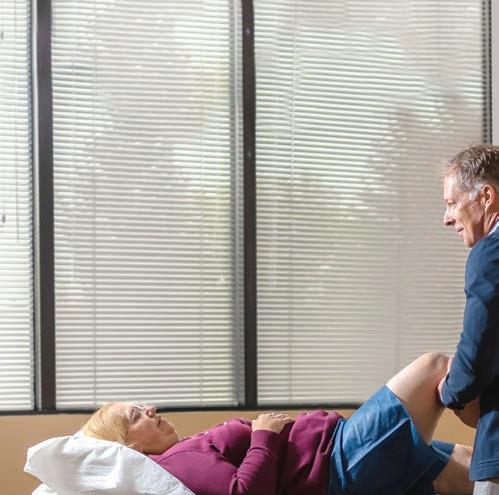
2 minute read
Marshall hosts fourth town hall
Focuses on 2023 bills
BY HALEY LENA HLENA@COLORADOCOMMUNITYMEDIA.COM
People lled the room at the Highlands Ranch Library as freshman state Rep. Robert Marshall, D-Highlands Ranch, held his fourth town hall event since his election to speak about his decisions on proposed bills in the 2023 Colorado legislative session.
In an event that was livestreamed on Facebook, Marshall, who represents House District 43, spent more than an hour discussing various topics, including the controversial gun bills making their way through the House and Senate.
ere are four bills concerning guns that the Democratic majority is moving toward the governor’s desk. ese include Senate Bill 168, manufacturers’ liability; Senate Bill 169, increasing the minimum age to purchase rearms; House Bill 1219, the three-day waiting period; and House Bill 1165, county authority to prohibit rearms discharge.
According to Marshall, all four have passed the House and two are in the Senate.
Before speaking about his reasoning behind his votes, Marshall brought up when he was rst asked to run by the Democratic Party.
“ ey came and asked my positions on both guns and abortion and I told them that, whatever my personal opinion is, as the representative for Highlands Ranch, my position was going to be to ght any e ort to roll back any restrictions in Colorado on rearms but I wouldn’t support any further restrictions,” said Marshall.
Marshall voted for Senate Bill 168, the manufacturers’ liability bill, as he believes it was not a restriction on rearms. e bill aims to lift the manufacturers’ immunity and make them just as responsible for proximate cause issues as any other industry.

“I look at the issue on its merits,” said Marshall. “And on its merits, they had given a very special immunity and privilege to an industry that was just not appropriate.” e other bill Marshall voted for was the Extreme Risk Protection Order, or ERPO, expansion to the Red Flag law. He said he has no problem with ERPO’s constitutional procedure for due process, however, the issue is that only sheri s were allowed to ask for an ERPO. Marshall said this became a big issue in the caucus because of the mass shooting that happened at Club Q in Colorado Springs.
Marshall agrees that DAs and mental health professionals should be allowed to ask for an ERPO. However, Marshall said he is hesitant about the educators having the ability.
“So, the educators was the only one where I had some issues,” said Marshall. “Is this appropriate or not? And I decided in the overall scheme of things, I wasn’t going to vote against that bill just based on that piece.”
Based on the commitment Marshall had made to not vote for any further restrictions on rearms, the two bills that he voted against were the bill pushing for a three-day waiting period to buy a gun, and the bill increasing the age from 18 to 21 to purchase a weapon.Marshall also brought up what is being called the “assault weapons ban,” which will be discussed in committee on April 5.
A public attendee asked Marshall to allow this subject to be fully debated and what would get his “yes” vote. In response, Marshall said he feels he needs to uphold his commitment. However, as there are still moving parts and the measure has been postponed a week, he would like to not go into detail.
Marshall moved the conversation to his positions on the three reproductive-rights bills.

Two bills Marshall voted for were Senate Bill 189, to waive copays and deductibles, and another Senate bill to keep other states’ anti-abortion laws from having an extraterritorial impact in Colorado.

“I was a big believer, regardless of the issue, that if we have a public policy in Colorado, we should protect it and not allow other states to interfere with it,” said Marshall.
Marshall also took time to talk about Rule 14, where Democrats voted to limit debate time regarding gun bills and other controversial bills Republicans have worked to stall.
Marshall said after nine hours of debate one day with no movement, another nine hours the next day and two broken agreements, it was time to limit the debate.
“We had more than two-thirds vote and we only need 50%.” said Marshall.









